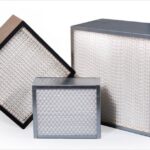In the heart of Saudi Arabia’s rapidly advancing industrial landscape, maintaining clean air quality has become paramount. With an increasing focus on health and safety, the demand for high-efficiency air filtration systems is surging. One of the key players in this arena is the ULPA (Ultra Low Penetration Air) filter, known for its superior filtration capabilities. This blog will explore the significance of ULPA filters, their manufacturing in Saudi Arabia, and their various applications across different sectors.
What Are ULPA Filters?
ULPA filters are designed to trap airborne particles with a size of 0.1 to 0.3 micrometres, achieving an efficiency of 99.999% or higher. This makes them significantly more efficient than HEPA (High-Efficiency Particulate Air) filters, which can only capture particles down to 0.3 micrometres at an efficiency of 99.97%. The meticulous construction of ULPA filters involves a dense mat of fibres, which creates a maze-like structure that effectively captures and retains particles.
Why ULPA Filters Are Essential
In industrial environments, where air quality can be compromised by pollutants, particulates, and even pathogens, the need for reliable filtration is crucial. ULPA filters play a significant role in:
Cleanroom Environments
Industries such as pharmaceuticals, biotechnology, and electronics require ultra-clean environments. ULPA filters ensure that the air remains free of contaminants, thereby safeguarding product quality and research integrity.
Healthcare Facilities
In hospitals and laboratories, ULPA filters are essential for controlling airborne infections. They help maintain sterile environments, crucial for patient safety and successful medical procedures.
Food and Beverage Industry
Maintaining high hygiene standards is critical in food processing. ULPA filters ensure that no harmful particles or microorganisms contaminate products, thus preserving public health.
Research and Development Labs
In scientific research, any contamination can skew results. ULPA filters provide the necessary air purity to foster accurate and reliable research outcomes.
Manufacturing ULPA Filters in Saudi Arabia
The growing emphasis on quality air filtration has led to the establishment of specialized ULPA filter manufacturers in KSA. These manufacturers leverage advanced technology and adhere to international standards to produce high-quality filters suitable for various applications.
Key Manufacturers in KSA
Local Expertise
Saudi Arabian manufacturers are increasingly investing in state-of-the-art equipment and technologies to produce ULPA filters that meet global standards. With a combination of local expertise and international collaborations, these companies are poised to meet the rising demand within the kingdom and beyond.
Quality Assurance
Manufacturers in KSA are committed to rigorous testing and quality assurance processes. This ensures that the ULPA filters produced are not only effective but also reliable, assuring industries that rely on them for air quality control.
Customization
Understanding that different industries have unique needs, many manufacturers offer customized ULPA filter solutions. This flexibility allows businesses to select filters tailored to their specific operational requirements, enhancing efficiency and performance.
The Role of ULPA Filters in Sustainable Development
As Saudi Arabia pushes towards a more sustainable future, the role of ULPA filters in reducing environmental impact cannot be understated. By ensuring that air quality is maintained at high standards, these filters contribute to the broader goals of public health and environmental preservation.
Energy Efficiency
While ULPA filters are designed to capture extremely fine particles, they also play a role in energy efficiency. High-quality filters reduce the load on HVAC systems, allowing them to operate more efficiently and consume less energy. This is particularly important in Saudi Arabia, where energy consumption can be significant due to the harsh climate.
Compliance with Regulations
With increasing regulations surrounding air quality and environmental standards, industries in Saudi Arabia must comply with stringent guidelines. Utilizing ULPA filters can help organizations meet these regulatory requirements, avoiding potential penalties and promoting a safer working environment.
Future Trends in ULPA Filter Manufacturing
As technology continues to evolve, the future of ULPA filter manufacturing looks promising. Key trends include:
Smart Filters
The integration of IoT (Internet of Things) technology into filtration systems is on the rise. Smart ULPA filters can monitor air quality in real-time, providing data analytics that helps optimize filter replacement cycles and maintenance schedules.
Biodegradable Materials
There is a growing trend towards sustainability in manufacturing practices. Future ULPA filters may utilize biodegradable materials, minimizing their environmental footprint.
Enhanced Filtration Technologies
Innovations in materials science could lead to the development of even more effective filtration media, increasing efficiency and reducing energy consumption.
Conclusion
ULPA filters represent a crucial component in the quest for cleaner air in Saudi Arabia. As the country continues to grow and industrialize, the demand for high-quality air filtration solutions will only increase. With local manufacturers stepping up to meet this need, the future of ULPA filters in Saudi Arabia looks bright. These filters not only enhance air quality but also contribute to the sustainability goals of industries across the nation. As we move forward, investing in advanced filtration technologies will play a key role in promoting health, safety, and environmental stewardship in the Kingdom.

